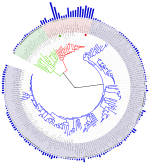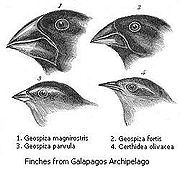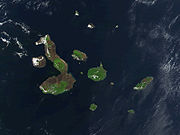
World Summit on Evolution
Encyclopedia
The World Summit on Evolution is an evolutionary biology meeting hosted at the Galapagos Islands
by Universidad San Francisco de Quito
USFQ, an Ecuadorian private liberal-arts university. Its focus is on recent research and new advances in our understanding of evolution and the diversity of life.
The World Summit on Evolution hosts more than 150 participants presenting invited and submitted talks, poster sessions, and scientific-outreach talks. It has been called "The Woodstock of Evolution", bringing together experts and students from widely different areas of evolutionary biology that rarely have the chance to meet. It has joined some of the world most famous researchers working on evolution
from over 15 different countries, including Peter and Rosemary Grant
, Niles Eldredge
, Antonio Lazcano
, Douglas Futuyma, Lynn Margulis
, Ada Yonath
, William H. Calvin
, Daniel Dennett
, among others.


 The World Summit on Evolution takes place at GAIAS (The Galapagos Academic Institute for the Arts and Sciences), part of the Universidad San Francisco de Quito
The World Summit on Evolution takes place at GAIAS (The Galapagos Academic Institute for the Arts and Sciences), part of the Universidad San Francisco de Quito
. GAIAS was established in 2002 at the capital town of the Galapagos province, Puerto Baquerizo Moreno, on the island of San Cristobal, one of the largest of the Galapagos Islands
.
The 4.5 hectares GAIAS campus is the only university campus on the historically significant Galapagos islands. GAIAS was founded on the principle that beyond being a college and center for the promotion and advancement of evolutionary science in Ecuador, it will become a first-rate institution for international students and researchers.
The Galapagos Islands inspired Charles Darwin
to define his evolutionary theory, which revolutionized our conception of the world in relation to the origin of all species, including humans. His ideas were presented in his monumental work On the Origin of Species.
The Galapagos Islands, however, are not important just because of Darwin's discoveries and observations. An impressive amount of scientific studies have been developed over the years after his visit. As information increases on the flora and fauna of the islands and their ecological patterns, it is clear that the Galapagos are a living laboratory of evolution.
The Second World Summit on Evolution will be launched to celebrate Charles Darwin's 200th birthday.
The 2009 summit will also include the first meeting of the Sociedad Iberoamericana de Biologia Evolutiva (SIBE). SIBE will be the first truly international forum that can lead to the establishment of academic and intellectual bonds between the Spanish- and Portuguese-speaking specialists in evolutionary biology.
Galápagos Islands
The Galápagos Islands are an archipelago of volcanic islands distributed around the equator in the Pacific Ocean, west of continental Ecuador, of which they are a part.The Galápagos Islands and its surrounding waters form an Ecuadorian province, a national park, and a...
by Universidad San Francisco de Quito
Universidad San Francisco de Quito
Universidad San Francisco de Quito USFQ is a liberal-arts, non-profit, private university located in Quito, Ecuador. It was the first totally-private self-financed university in Ecuador and the first liberal-arts institution in the Andean region...
USFQ, an Ecuadorian private liberal-arts university. Its focus is on recent research and new advances in our understanding of evolution and the diversity of life.
The World Summit on Evolution hosts more than 150 participants presenting invited and submitted talks, poster sessions, and scientific-outreach talks. It has been called "The Woodstock of Evolution", bringing together experts and students from widely different areas of evolutionary biology that rarely have the chance to meet. It has joined some of the world most famous researchers working on evolution
Evolution
Evolution is any change across successive generations in the heritable characteristics of biological populations. Evolutionary processes give rise to diversity at every level of biological organisation, including species, individual organisms and molecules such as DNA and proteins.Life on Earth...
from over 15 different countries, including Peter and Rosemary Grant
Peter and Rosemary Grant
Peter Raymond Grant and Barbara Rosemary Grant, a married couple, are both British evolutionary biologists at Princeton University; each holds the position of Emeritus Professor. They are noted for their work concerning Darwin's finches on the Galápagos Island named Daphne Major...
, Niles Eldredge
Niles Eldredge
Niles Eldredge is an American paleontologist, who, along with Stephen Jay Gould, proposed the theory of punctuated equilibrium in 1972.-Education:...
, Antonio Lazcano
Antonio Lazcano
Antonio Lazcano is a Mexican biology researcher and professor of the School of Sciences at the National Autonomous University of Mexico in Mexico City. He has studied the origin and early evolution of life for more than 35 years....
, Douglas Futuyma, Lynn Margulis
Lynn Margulis
Lynn Margulis was an American biologist and University Professor in the Department of Geosciences at the University of Massachusetts Amherst. She is best known for her theory on the origin of eukaryotic organelles, and her contributions to the endosymbiotic theory, which is now generally accepted...
, Ada Yonath
Ada Yonath
Ada E. Yonath is an Israeli crystallographer best known for her pioneering work on the structure of the ribosome. She is the current director of the Helen and Milton A. Kimmelman Center for Biomolecular Structure and Assembly of the Weizmann Institute of Science. In 2009, she received the Nobel...
, William H. Calvin
William H. Calvin
William H. Calvin, Ph.D., is an American theoretical neurophysiologist and professor at the University of Washington in Seattle. He is a well-known popularizer of neuroscience and evolutionary biology, including the hybrid of these two fields, neural Darwinism...
, Daniel Dennett
Daniel Dennett
Daniel Clement Dennett is an American philosopher, writer and cognitive scientist whose research centers on the philosophy of mind, philosophy of science and philosophy of biology, particularly as those fields relate to evolutionary biology and cognitive science. He is currently the Co-director of...
, among others.
Objectives
Objectives:
- To join experts from different branches of evolutionary biology to discuss on the impacts of recent discoveries in order to integrate them inside the basic concepts of evolution.
Through a series of presentations and discussions the participants ask the big questions: What is the evidence for the theory of evolution? How has each field and their respective approaches deepened our understating? And where are the future horizons? Bringing together international experts and students for debate helps to answer these questions and hopefully lead to decisions that will shape the direction of evolutionary science in the foreseeable future.
- To remind to the scientific community on the importance of the Galapagos Islands and the discoveries produced thanks to their particular natural resources. This summit will present the islands as a living and dynamic laboratory of evolution.
- To promote Ecuador, its researcher, and its academic institutions working to develop scientific knowledge.
Subjects
Subjects:
- Origin and diversification of life. How did the first living cells originate, clues provided by RNA, new paradigms in prokaryotic and early eukaryotic evolution.
- Evolution of plants and animals. The origin of animals and fungi, evolution of tropical claiming plants and social behavior in animals.
- Human Evolution. The study of the human's diet and digestive system explains the human evolution and Darwin's ideas applied to human evolution.
- Evolution and infectious agents. The origin and evolution of AIDS and how bacteria acquire pathogenic features
- How to face the spread of creationism and Intelligent Design. An entire session of the summit focuses directly on containing the spread of creationism and intelligent design while improving the public’s understanding of evolution throughout the Americas and elsewhere.
Location

Universidad San Francisco de Quito
Universidad San Francisco de Quito USFQ is a liberal-arts, non-profit, private university located in Quito, Ecuador. It was the first totally-private self-financed university in Ecuador and the first liberal-arts institution in the Andean region...
. GAIAS was established in 2002 at the capital town of the Galapagos province, Puerto Baquerizo Moreno, on the island of San Cristobal, one of the largest of the Galapagos Islands
Galápagos Islands
The Galápagos Islands are an archipelago of volcanic islands distributed around the equator in the Pacific Ocean, west of continental Ecuador, of which they are a part.The Galápagos Islands and its surrounding waters form an Ecuadorian province, a national park, and a...
.
The 4.5 hectares GAIAS campus is the only university campus on the historically significant Galapagos islands. GAIAS was founded on the principle that beyond being a college and center for the promotion and advancement of evolutionary science in Ecuador, it will become a first-rate institution for international students and researchers.
The Galapagos Islands inspired Charles Darwin
Charles Darwin
Charles Robert Darwin FRS was an English naturalist. He established that all species of life have descended over time from common ancestry, and proposed the scientific theory that this branching pattern of evolution resulted from a process that he called natural selection.He published his theory...
to define his evolutionary theory, which revolutionized our conception of the world in relation to the origin of all species, including humans. His ideas were presented in his monumental work On the Origin of Species.
The Galapagos Islands, however, are not important just because of Darwin's discoveries and observations. An impressive amount of scientific studies have been developed over the years after his visit. As information increases on the flora and fauna of the islands and their ecological patterns, it is clear that the Galapagos are a living laboratory of evolution.
Past and future summits
- 9-12 June 2005 - First World Summit on Evolution
- 22-26 August 2009 - Second World Summit on Evolution
The Second World Summit on Evolution will be launched to celebrate Charles Darwin's 200th birthday.
The 2009 summit will also include the first meeting of the Sociedad Iberoamericana de Biologia Evolutiva (SIBE). SIBE will be the first truly international forum that can lead to the establishment of academic and intellectual bonds between the Spanish- and Portuguese-speaking specialists in evolutionary biology.

